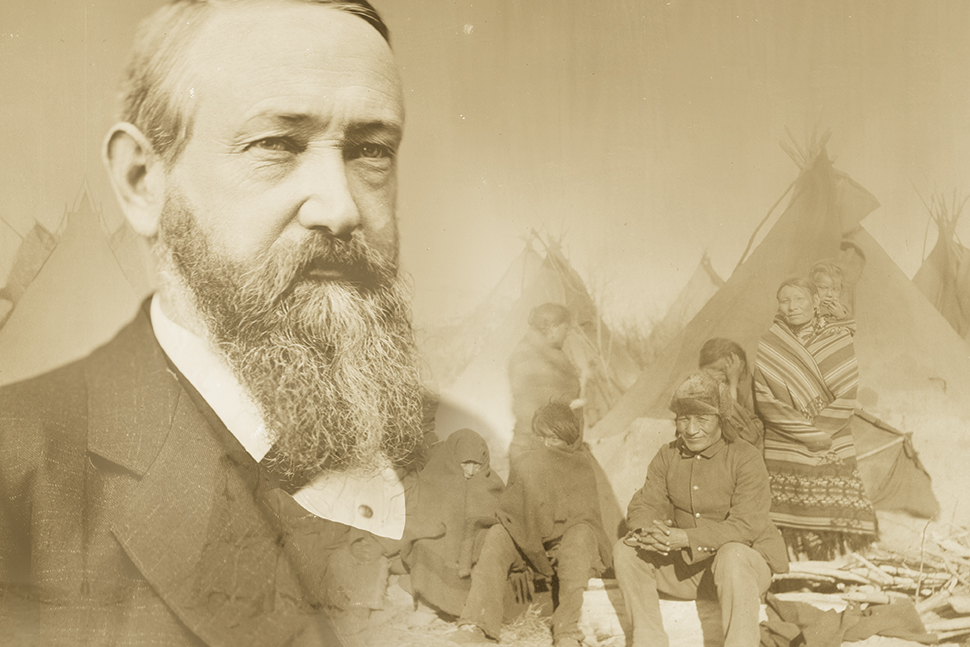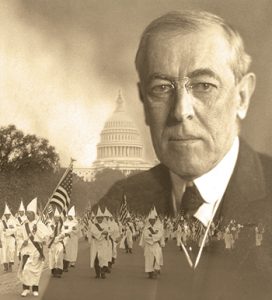Tarnished Legacies

For 67 years, Princeton (N.J.) University’s School of Public and International Affairs bore the name of former US President Woodrow Wilson, who spoke favorably of the Ku Klux Klan, kept Black students from being admitted to Princeton during his tenure as university president, and supported the racial segregation of federal agencies. In response to student protests and the resurgence of the Black Lives Matter movement, in June 2020 the school dropped his name—an act that has led to a wider awareness of Wilson’s racist legacy.
It also has led to repercussions at Woodrow Wilson Presidential Library and Museum in Staunton, Virginia. When, in 2015, Princeton students staged a 32-hour sit-in demanding that the school remove Wilson’s name, “we had a huge drop in funding,” says Robin van Seldeneck, the Virginia library and museum’s president and CEO. “We had people saying, ‘Take me off your list’ and ‘I didn’t know Wilson was such a racist.’ So we said, ‘We need to do a better job sharing who Woodrow Wilson is.’”
‘The good, the bad, and otherwise’
As presidential libraries grapple with the racist legacies of their subjects, many of them find it helpful to rely on what Clay S. Jenkinson, humanities scholar at the Theodore Roosevelt Center at Dickinson (N. Dak.) State University, calls “proactive candor.”
“We try hard not to paper over or whitewash any parts of Roosevelt’s legacy that have been objectionable,” Jenkinson says. “We want never to be defensive.”
Charles A. Hyde, president and CEO of the Benjamin Harrison Presidential Site in Indianapolis, says that while it’s important to talk about Harrison’s advocacy for African Americans’ civil rights, it’s equally important to discuss his racist treatment of Indigenous people and his role in the massacre at Wounded Knee. “I want to share stories—the good, the bad, and otherwise—especially as they’re relevant to today,” Hyde says. “It gives insight into choices we’re making now and how they may go awry.”
In van Seldeneck’s view, conversations about race may not be comfortable, but they’re integral to her institution’s forward-facing mission. “We’re not looking to defend or explain what Wilson did,” she says. “We talk about the fact that he was the last president born in a home with enslaved labor, and that his father was the chaplain of the Confederate Army. We address who he was, both good and bad. And we’ve come a long way, but we have farther to go.”
NARA and Executive Order 13950
Some presidential libraries avoid conversations about racism, whether because of collection directives or pressure from a president’s descendants or the institution’s trustees. Jack Robertson, librarian emeritus at Jefferson Library at Monticello in Charlottesville, Virginia, retired in 2020 after more than 20 years at the library. He says that unlike the Jefferson Library, the libraries administered by the National Archives and Records Administration (NARA) are by and large driven by their missions to take a laudatory approach to their subjects. “The NARA libraries are much more memorials,” he explains. “They’re the mausolea of the American presidency. They’re not the place to go to learn about the life and times and legacy [of their subjects] because they don’t collect that way. They’re not centers for scholarship.”
Any inclination for NARA presidential libraries to engage with the topic of racism was further impeded by Executive Order 13950, issued in September 2020 by President Trump. Titled “Combating Race and Sex Stereotyping,” it was written to counter “the pernicious and false belief that America is an irredeemably racist and sexist country.” It threatens to punitively pull federal funding from organizations that address institutional racism.
In response to an interview request, a public and media communications spokesperson for NARA sent the following statement: “We are approaching issues of racism and related historical narratives holistically as an agency. Given that this is an active, ongoing process, it is premature to grant interviews. However, we are happy to provide updates along the way. Archivist of the United States David S. Ferriero created an agency Task Force on Racism to address issues related to racial inequality. The task force includes a subgroup on museums that will examine and address how museums throughout our agency will ensure a diversity of representation, viewpoints, access, and outreach in our exhibits, education, and public programs. Another subgroup on archival description will examine and address anachronistic or offensive terminology in legacy descriptions in our online National Archives Catalog.”
After NARA’s statement was disseminated across its library system, some libraries declined to comment for this story. “I’ve been informed the National Archives office in Washington, D.C., released a statement … in regards to all presidential libraries,” wrote Matt Porter, communications officer at the John F. Kennedy Library Foundation in Boston. “We cannot add anything in addition to that statement.”

A demand for honesty
Even at non-NARA institutions, there’s a public perception that by nature, presidential libraries put their subjects on pedestals. “People don’t see us as unbiased,” says Christie M. Weininger, executive director of Rutherford B. Hayes Presidential Library and Museums at Spiegel Grove in Fremont, Ohio.
In the case of Hayes, whose contested 1877 election and presidency is often blamed for ushering in the Jim Crow era, Weininger points out that it helps to rely on his own words as often as possible. “People will trust his writing more than our interpretation of it,” she says. “They expect us to sugarcoat the withdrawal of troops in South Carolina and Louisiana. So we ask visitors what would have happened if he had left the troops there, and we let them talk it out.”
Hayes Presidential Library and Museums Historian Dustin McLochlin adds that even experts can find these topics challenging. “A friend was asking about Hayes’s decisions, and I had to explain that not everyone at the time hated him,” he says. “Not even everyone in the Black community. I feel the obligation to talk about it, but these things are impossible [to explain] when you’re giving a 45-minute tour.”
Increasingly, Jenkinson says, users and guests demand historical honesty. “They want the authentic truth,” he says. “It won’t do any good for us to give them a children’s book about Roosevelt. They will reject you for not having the courage to explore the truth in an open way.” Drawing the line between championing and chronicling is tricky, however. “Of course we admire Roosevelt,” Jenkinson says. “But we’re not fans, in that we don’t get edgy if someone says his race views are hard to stomach for a 21st-century person.”
He explains, for instance, that Roosevelt believed it was the mission of white Anglo-Saxons to carry rule of law to the far corners of the world. “So we cringe,” he says. “And when people ask about that, we try to contextualize. We’re not personally invested in protecting him from scrutiny. In fact, just the opposite.” These conversations continue to resonate, he adds: “We haven’t graduated beyond these questions because we still have a fundamental race problem in the United States.”
Weininger also acknowledges that public sentiment is maturing. “Way back when, historical homes were criticized for being ‘furniture tours,’” she says. “There’s been a shift to move society forward, but not everyone in our industry is there.”
Seeking expertise
The march toward equity is ongoing, and many national institutions and presidential libraries are finding they need outside assistance to make internal changes. “As we approach challenging subjects, we want to move forward with integrity,” Hyde says. “We want to be truthful and bring in partners who can help us.”
Sometimes that means hiring advisors to help staff learn to engage productively. “Some of our tour guides don’t feel comfortable having those conversations, because they’re so complex,” Weininger says. “We get pressed, and the potential is there for it to get confrontational. It’s not what they trained for, so we’re working on our educational materials, to make these conversations easier. We’ve also talked with an outside facilitator to help us train our staff on having difficult conversations with the public and defusing emotions.”
In 2019, Woodrow Wilson Presidential Library and Museum received a $60,000 planning grant, which went toward exhibition updates. “We’ve purposely made them say [that] there are areas we did not give enough emphasis to previously,” van Seldeneck says. She adds that her board of trustees has also been supportive. “We lost a few donors who said we shouldn’t be wading into this, or who think we should stand up for Woodrow Wilson. But it’s not my job to stand up for him. It’s my job to show a full and balanced legacy.”
An ongoing negotiation
Both van Seldeneck and Jenkinson point to Monticello as an example of an institution that has gotten it right. “At the Jefferson Library at Monticello, they decided to talk about Sally Hemings and rebuild slave quarters,” Jenkinson says, referring to the enslaved woman who bore the third US president several children. “In doing so, they created a model of what responsible historical interpretation should look like.”
Yet even Robertson disagrees on the question of interpretation. “As librarians, I have always felt we’re not in a position to take a stand, make a statement, or direct an interpretation,” he says. “We have no business interpreting. [We should] just put [information] out in a way that’s use-neutral.”
McLochlin agrees that allowing the public to see everything is paramount. “Hayes said he was willing to let his reputation be destroyed in the hopes that his position was the right position,” he says. “Now it’s up to the public, and we try to provide a solid foundation for opinion.”
Fortunately, the tools to do that are becoming more accessible. “Digital access of primary source documents will change everything,” says Jenkinson, whose library’s digital presidential archive is among the nation’s most comprehensive. “Someone can be in their bathroom on Sunday morning examining the entire works of Roosevelt. This means we’re going to get a new round of scholars and writers, and we don’t have to predetermine the interpretation of the story. History is an ongoing negotiation.”
Source of Article